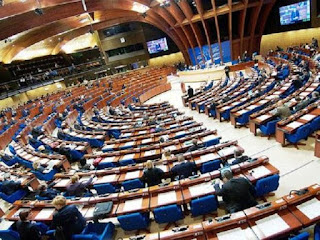Previously, U.S. 6th Fleet, based in the Mediterranean Sea reported that Carney was on its way to the Black Sea to join the drills. Sea Breeze 2019, the Ukrainian-American military drills will begin in Odesa on July 1. The State Border Guard reported this June 26. Traditionally, the drills will be held at sea, on the ground, in the air and under the water surface.
Sunday, June 30, 2019
USS Carney enters Black Sea waters for Sea Breeze 2019 drills
Previously, U.S. 6th Fleet, based in the Mediterranean Sea reported that Carney was on its way to the Black Sea to join the drills. Sea Breeze 2019, the Ukrainian-American military drills will begin in Odesa on July 1. The State Border Guard reported this June 26. Traditionally, the drills will be held at sea, on the ground, in the air and under the water surface.
Posted by Oleg Bezverkhnii at 23:08 0 comments
Saturday, June 29, 2019
Seven delegations leave PACE session hall in demarche over Russia's reinstatement
Posted by Oleg Bezverkhnii at 09:36 0 comments
Friday, June 28, 2019
Ukraine-U.S. Sea Breeze drills to kick off in Odesa on July 1
Posted by Oleg Bezverkhnii at 09:42 0 comments
Thursday, June 27, 2019
Poltava marks the 310th anniversary of the main battle of the Great Northern war
Posted by Oleg Bezverkhnii at 23:26 0 comments
Wednesday, June 26, 2019
U.S. may provide extra lethal armament to Ukraine, - Senator Rob Portman
Posted by Oleg Bezverkhnii at 12:57 0 comments
Ukraine's National Bank showcases brand new UAH 1,000 banknote
Posted by Oleg Bezverkhnii at 09:28 0 comments
Saturday, June 22, 2019
On June 22, the Day of Sorrow and Remembrance of Victims of War is marked in Ukraine.
Posted by Oleg Bezverkhnii at 12:22 0 comments
Friday, June 21, 2019
Chernobyl: Ex-president tells who decided to build nuclear power plant near Kyiv
Posted by Oleg Bezverkhnii at 20:59 0 comments
Saturday, June 15, 2019
Chernobyl: Russian communist party calls for ‘disgusting’ HBO show to be banned
Posted by Oleg Bezverkhnii at 09:27 0 comments
Wednesday, June 12, 2019
Lithuania to donate Soviet-made light small arms ammunition to Ukraine
Posted by Oleg Bezverkhnii at 11:11 0 comments
Thursday, June 6, 2019
Zelensky, Juncker set date for Ukraine-EU summit
Posted by Oleg Bezverkhnii at 09:07 0 comments














